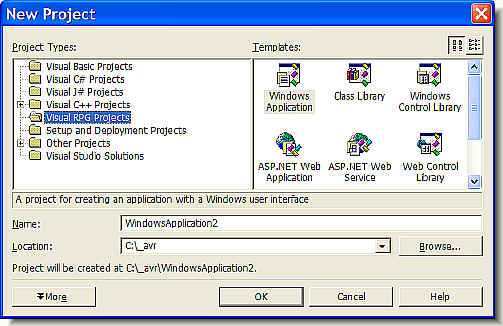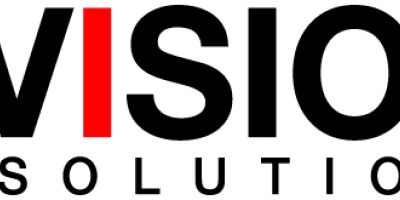New technologies can offer organizations the opportunity to improve productivity and/or reap the reward of new revenue streams. Nonetheless, their introduction can be expensive and disruptive. One major contributing factor to this cost and disruption is the need to hire new employees or train existing staff to acquire the required skills. Organizations with existing iSeries development skills can avoid some of these costs when building new Web-enabled, .NET-based systems by using ASNA Visual RPG (AVR) for Microsoft Visual Studio .NET to give their developers the ability to develop .NET-compliant programs using RPG syntax.
AVR provides a Windows-based RPG compiler that generates code that is 100% compliant with Microsoft Intermediate Language (MSIL), the language underlying all applications running under the .NET framework. The assemblies generated by AVR run under the .NET platform using either traditional fat Windows clients or browser-based user interfaces.
Using ASNA's DataGate for iSeries 400 communication middleware software, AVR applications connect effectively to IBM's iSeries and AS/400 servers (from OS/400 V4R2 and up). These applications can perform read/write record-level access to DB2 Universal Database for physical and logical files. They can also take advantage of OS/400 and i5/OS host program objects through a CALL/PARM interface with which RPG programmers are very familiar.
In addition to DB2 Universal Database, applications developed with AVR can also connect to Microsoft's SQL Server or ASNA's own Acceler8DB database, without changes to any of these databases and without change to the application.
Visual Studio .NET Integration
AVR integrates transparently into Microsoft Visual Studio .NET, adding RPG language capabilities to it without eliminating the other common .NET languages such as C# or Visual Basic. Consequently, Visual Studio can be used as a common development environment for all programmers creating applications for the Internet, irrespective of the language that they use. Since all programs must be compiled into MSIL in order to run on the .NET framework, the result is the same regardless of whether the high-level language used is RPG or any of the standard Visual Studio .NET languages. (See Figure 1.)
Figure 1: Programmers can use Visual Studio as a common development environment, regardless of which of many languages they prefer to use.
The RPG used in AVR is not completely identical to iSeries RPG, but the differences are small enough that iSeries RPG programmers will adapt to the new environment quite easily and with minimal training. The differences in the RPG version come about because of the need to enable facilities such as Web Services, inheritance and polymorphism, and event-driven programming, as well as to support .NET's complete set of name spaces.
Because it operates within Visual Studio, AVR works seamlessly with any third-party applications (such as source/versioning control) that are capable of integrating into Visual Studio. AVR also takes advantage of the powerful facilities inherent in Visual Studio 2003, including its debugger and source code editor. Using AVR, the Intellisense collapsible code and color coding features of the Visual Studio editor are tuned for RPG, thereby enhancing productivity for RPG programmers. In particular, Intellisense provides help completing syntax. As a developer keys in code, Intellisense displays a pop-up box containing all RPG elements that begin with the characters typed so far. This can be particularly helpful for iSeries programmers who do not yet have extensive experience with the.NET-related RPG elements supported by AVR.
Benefits
AVR for .NET offers a number of business benefits, including the following:
- Because AVR for .NET employs a superset of the RPG programming language, RPG developers can learn AVR for .NET easily and, thus, quickly use it to produce .NET applications, thereby reducing training time and cost. At the same time, developers can pick up new .NET skills, thereby advancing their careers and enhancing the value that they provide to their employers.
- AVR for .NET allows existing OS/400 and i5/OS program objects to be called from Windows- or browser-based applications, thereby protecting the investment organizations have made in their applications. Employing new code developed using AVR for .NET, legacy program objects can serve as back-ends for new Web Services.
- Because AVR for .NET integrates into Visual Studio alongside other languages common to the Web, it provides a common development environment, supporting the latest Web-based technologies, for all of an organization's programming teams, without forcing RPG programmers to abandon their skills. It thus builds a bridge between Visual Basic, C#, Visual J#, and RPG programming teams.
- AVR for .NET supports Web Services standards such as XML, XSL, SOAP, WSDL, and UDDI. Adhering to these widely accepted industry standards, rather than adopting proprietary protocols, reduces the chance of the resulting applications abruptly becoming obsolete, as can happen should the owner of a proprietary protocol go out of business.
As a result of these benefits, AVR has gained considerable acceptance in the market and is already used by more than 10,000 developers.
About ASNA
Established in 1982, ASNA is a privately held company with a head office in San Antonio, Texas, and European headquarters in Guildford, England. More than 30 distributors and numerous business partners sell and service ASNA offerings around the world. ASNA is a Microsoft Certified Partner and a member of IBM's PartnerWorld for Developers program.
Joel Klebanoff is a consultant, a writer, and president of Klebanoff Associates, Inc., a Toronto, Canada-based marketing communications firm. Joel has 25 years experience working in IT, first as a programmer/analyst and then as a marketer. He holds a Bachelor of Science in computer science and an MBA, both from the University of Toronto. Contact Joel at

ASNA Inc.
9901 West IH-10, Suite 1000
San Antonio, Texas 78230
USA
Web: www.asna.com
Email:
Tel: 800.289.ASNA (2762) or 210.408.0212
Fax: 210.408.0211

























 More than ever, there is a demand for IT to deliver innovation. Your IBM i has been an essential part of your business operations for years. However, your organization may struggle to maintain the current system and implement new projects. The thousands of customers we've worked with and surveyed state that expectations regarding the digital footprint and vision of the company are not aligned with the current IT environment.
More than ever, there is a demand for IT to deliver innovation. Your IBM i has been an essential part of your business operations for years. However, your organization may struggle to maintain the current system and implement new projects. The thousands of customers we've worked with and surveyed state that expectations regarding the digital footprint and vision of the company are not aligned with the current IT environment. TRY the one package that solves all your document design and printing challenges on all your platforms. Produce bar code labels, electronic forms, ad hoc reports, and RFID tags – without programming! MarkMagic is the only document design and print solution that combines report writing, WYSIWYG label and forms design, and conditional printing in one integrated product. Make sure your data survives when catastrophe hits. Request your trial now! Request Now.
TRY the one package that solves all your document design and printing challenges on all your platforms. Produce bar code labels, electronic forms, ad hoc reports, and RFID tags – without programming! MarkMagic is the only document design and print solution that combines report writing, WYSIWYG label and forms design, and conditional printing in one integrated product. Make sure your data survives when catastrophe hits. Request your trial now! Request Now. Forms of ransomware has been around for over 30 years, and with more and more organizations suffering attacks each year, it continues to endure. What has made ransomware such a durable threat and what is the best way to combat it? In order to prevent ransomware, organizations must first understand how it works.
Forms of ransomware has been around for over 30 years, and with more and more organizations suffering attacks each year, it continues to endure. What has made ransomware such a durable threat and what is the best way to combat it? In order to prevent ransomware, organizations must first understand how it works. Disaster protection is vital to every business. Yet, it often consists of patched together procedures that are prone to error. From automatic backups to data encryption to media management, Robot automates the routine (yet often complex) tasks of iSeries backup and recovery, saving you time and money and making the process safer and more reliable. Automate your backups with the Robot Backup and Recovery Solution. Key features include:
Disaster protection is vital to every business. Yet, it often consists of patched together procedures that are prone to error. From automatic backups to data encryption to media management, Robot automates the routine (yet often complex) tasks of iSeries backup and recovery, saving you time and money and making the process safer and more reliable. Automate your backups with the Robot Backup and Recovery Solution. Key features include: Business users want new applications now. Market and regulatory pressures require faster application updates and delivery into production. Your IBM i developers may be approaching retirement, and you see no sure way to fill their positions with experienced developers. In addition, you may be caught between maintaining your existing applications and the uncertainty of moving to something new.
Business users want new applications now. Market and regulatory pressures require faster application updates and delivery into production. Your IBM i developers may be approaching retirement, and you see no sure way to fill their positions with experienced developers. In addition, you may be caught between maintaining your existing applications and the uncertainty of moving to something new. IT managers hoping to find new IBM i talent are discovering that the pool of experienced RPG programmers and operators or administrators with intimate knowledge of the operating system and the applications that run on it is small. This begs the question: How will you manage the platform that supports such a big part of your business? This guide offers strategies and software suggestions to help you plan IT staffing and resources and smooth the transition after your AS/400 talent retires. Read on to learn:
IT managers hoping to find new IBM i talent are discovering that the pool of experienced RPG programmers and operators or administrators with intimate knowledge of the operating system and the applications that run on it is small. This begs the question: How will you manage the platform that supports such a big part of your business? This guide offers strategies and software suggestions to help you plan IT staffing and resources and smooth the transition after your AS/400 talent retires. Read on to learn:
LATEST COMMENTS
MC Press Online